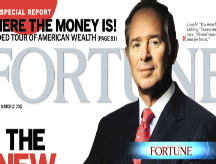KKR planning to go public, a year after filing
The private equity firm anticipates the transaction, which involves a European affiliate, to value KKR at $12 billion to $15 billion.
NEW YORK (CNNMoney.com) -- Kohlberg Kravis Roberts & Co. is planning to go public in a transaction that could value the firm at between $12 billion to $15 billion, according to The Wall Street Journal, citing people familiar with the matter.
The private-equity firm, founded by Henry Kravis and George Roberts, filed for an initial public offering more than a year ago and is plunging into the public markets at a dark time for private fund managers.
KKR is asking investors to believe in both the firm's past and its future. Indeed, KKR has proved itself a consistent performer since its founding 32 years ago, delivering an average annual return of 26%.
Part of KKR's plans include bigger investments in infrastructure and real estate, mezzanine debt investing and old-fashioned stock picking. The hope is to transform KKR into a broad asset manager, anchored but not exclusively controlled by the private-equity earnings.
This was also the mission of Blackstone Group LP, which went public in the summer of 2007 just as the credit markets were cresting. So far Blackstone (BX) shares have performed poorly, as investors fret about the strength of the firm's earnings stream. Blackstone shares trade at about 13 times the company's expected 2009 earnings.
KKR is taking pains to differentiate itself from Blackstone in its offering plan, which carries a number of unique features.
The first involves KKR's publicly traded European affiliate, called KPE. Shares in this vehicle have languished, as there hasn't been deep liquidity in the market, nor great enthusiasm for its investments, which largely include stakes in KKR's private-equity transactions.
KPE shares will be exchanged for new shares of the NYSE-listed KKR. Those shares will effectively become the only publicly traded shares available and will represent 21% of the total value of the company.
KKR doesn't plan to sell any more shares to the public. In addition, KPE shareholders will be given what is known as a "contingent value right" that will award them extra shares in the new KKR should the value of the newly exchanged stock not reach a certain level over the next three years.
These features are designed to keep KPE holders happy, who still must approve the transaction for the full KKR transaction to occur.
Meanwhile, KKR's top managers will be "locked up" in the company for six to eight years, meaning they can't sell stock until that period ends.
In addition, the fund is setting aside about 16% of the total value of the firm, to be distributed to KKR partners and employees in the future. The firm "doesn't want the dynamic" of other financial-service firm IPOs, in which wealth was clearly split between pre-IPO and post-IPO partners. ![]()


